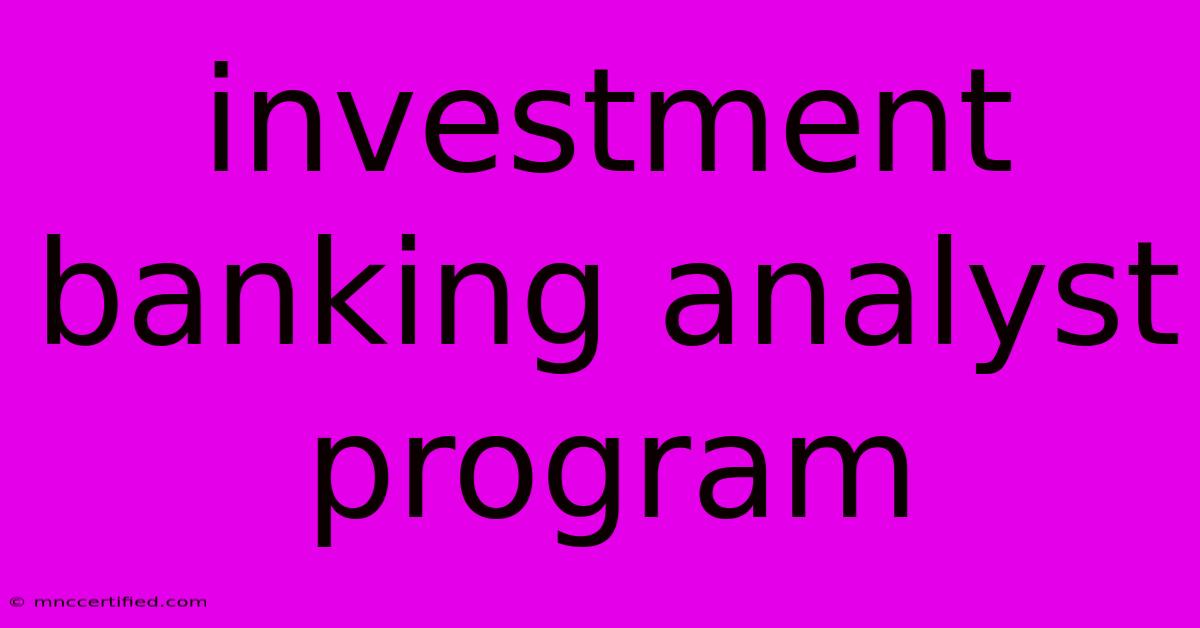Investment Banking Analyst Program

Table of Contents
Cracking the Code: Your Guide to the Investment Banking Analyst Program
Landing an Investment Banking Analyst (IBA) program is a highly competitive but incredibly rewarding pursuit. This comprehensive guide delves into every aspect, from understanding the role to mastering the interview process, helping you navigate this challenging yet lucrative career path.
What is an Investment Banking Analyst Program?
Investment banking analyst programs are highly sought-after entry-level positions within the financial industry. These intensive programs typically last two years and provide analysts with invaluable on-the-job training and mentorship. IBAs play a crucial role in supporting senior bankers on a wide range of financial transactions. Think mergers and acquisitions (M&A), initial public offerings (IPOs), debt financing, and equity research. It's a fast-paced, demanding, and intellectually stimulating environment that shapes future leaders in finance.
Key Responsibilities of an Investment Banking Analyst:
- Financial Modeling: Creating complex financial models to analyze potential deals and evaluate investment opportunities. This involves deep proficiency in Excel and financial statement analysis.
- Pitch Book Preparation: Developing compelling presentations for clients, showcasing deal strategies, and highlighting market opportunities. Strong PowerPoint skills are essential.
- Due Diligence: Conducting thorough research and analysis to assess the financial health and risks associated with potential investments. This requires meticulous attention to detail and strong analytical abilities.
- Valuation: Applying various valuation techniques (DCF, precedent transactions, etc.) to determine the fair market value of companies and assets.
- Data Collection and Analysis: Gathering and interpreting large datasets to support investment decisions. Proficiency in data analysis tools is advantageous.
The Path to Success: Navigating the Application Process
The application process for an IBA program is rigorous and highly competitive. Here's a breakdown of the key steps:
1. Networking: Building Your Connections
Networking is paramount. Attend industry events, career fairs, and informational interviews. Leverage LinkedIn to connect with professionals in investment banking. Building relationships can provide valuable insights and potentially lead to referral opportunities.
2. Resume and Cover Letter: Crafting a Winning Application
Your resume and cover letter are your first impression. Highlight relevant experiences, quantifiable achievements, and your passion for finance. Tailor your application materials to each specific firm and program. Seek feedback from career counselors or mentors to ensure your application is polished and compelling.
3. The Interview Process: Preparing for Success
The interview process typically consists of several rounds, including:
- First-round interviews: Often conducted by recruiters or junior bankers, focusing on your resume, skills, and career aspirations.
- Technical interviews: Assess your financial modeling skills, valuation knowledge, and understanding of accounting principles. Practice case studies and be prepared to solve complex problems under pressure. Resources like Wall Street Prep and Breaking into Wall Street can be invaluable here.
- Behavioral interviews: Explore your personality, teamwork abilities, problem-solving skills, and how you handle pressure. Utilize the STAR method (Situation, Task, Action, Result) to structure your responses.
- Partner interviews: Final-round interviews with senior managing directors who evaluate your overall fit within the firm's culture.
Beyond the Program: Career Progression and Opportunities
The IBA program is a springboard to a successful career in investment banking. After two years, many analysts transition into Associate roles, taking on greater responsibility and leadership opportunities. Potential career paths include:
- Moving to a more senior position within investment banking.
- Transitioning to private equity or hedge funds.
- Pursuing an MBA degree to further enhance career prospects.
- Moving into other financial services roles, such as corporate finance or wealth management.
Key Skills for Success: Developing Your Competitive Edge
Success in an IBA program requires a unique blend of skills:
- Strong analytical and problem-solving skills: Ability to analyze complex data and develop creative solutions.
- Financial modeling expertise: Proficiency in Excel and financial modeling software.
- Excellent communication and presentation skills: Ability to convey complex information clearly and effectively.
- Teamwork and collaboration: Working effectively with colleagues in a fast-paced environment.
- Resilience and adaptability: The ability to handle pressure and adapt to changing circumstances.
By carefully preparing and strategically approaching each stage of the application process, you significantly increase your chances of securing a coveted spot in an Investment Banking Analyst program. Remember, dedication, perseverance, and a genuine passion for finance are crucial for success in this challenging but rewarding career.

Thank you for visiting our website wich cover about Investment Banking Analyst Program. We hope the information provided has been useful to you. Feel free to contact us if you have any questions or need further assistance. See you next time and dont miss to bookmark.
Featured Posts
-
Wolverine 3 Canada Demands Weapon X
Nov 17, 2024
-
Trump Appoints Youngest White House Press Secretary
Nov 17, 2024
-
Arkansas Vs Texas Live Score Game Recap
Nov 17, 2024
-
Moonflower Murders Bbc Full Cast And Episodes
Nov 17, 2024
-
Kings Fox Sets Franchise Record
Nov 17, 2024